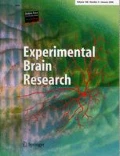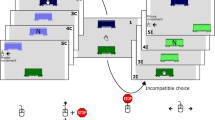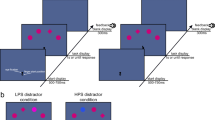Abstract
It has been suggested that, when movements are planned within cluttered environments, competing responses programmed to distracting stimuli are inhibited based on their relation to the action being performed. Further, as a result of this inhibition, the path of the movement made to the target object deviates away from the distractor. In contrast to the object avoidance hypothesis, the results of the present study show that, for aiming movements made in environments in which distractors are present, the path of the movement veers toward the distractor. Moreover, the effects of the distractors on the movement trajectory were independent of the direction of limb movement. These findings suggest that, when a distractor is not a potential physical barrier, a response to the distractor may be activated along with the target response and, owing to temporal advantages, cause a deviation of the movement trajectory toward the distractor.
Similar content being viewed by others
Author information
Authors and Affiliations
Additional information
Received: 27 July 1998 / Accepted: 5 March 1999
Rights and permissions
About this article
Cite this article
Welsh, T., Elliott, D. & Weeks, D. Hand deviations toward distractors Evidence for response competition. Exp Brain Res 127, 207–212 (1999). https://doi.org/10.1007/s002210050790
Issue Date:
DOI: https://doi.org/10.1007/s002210050790




